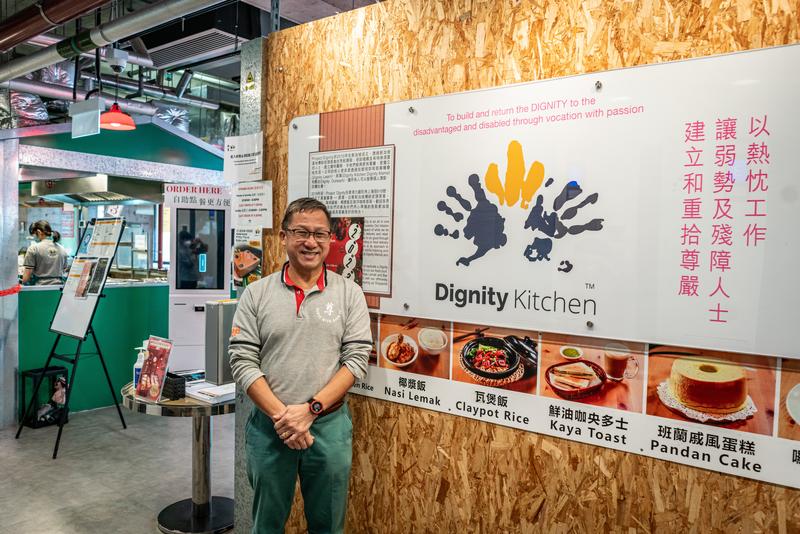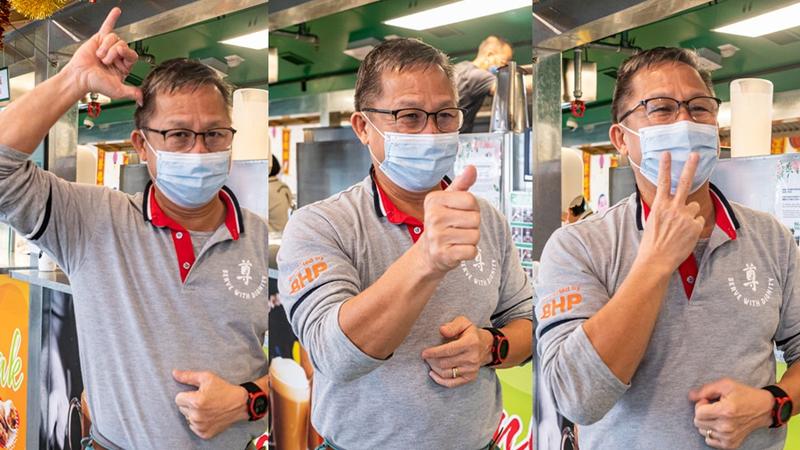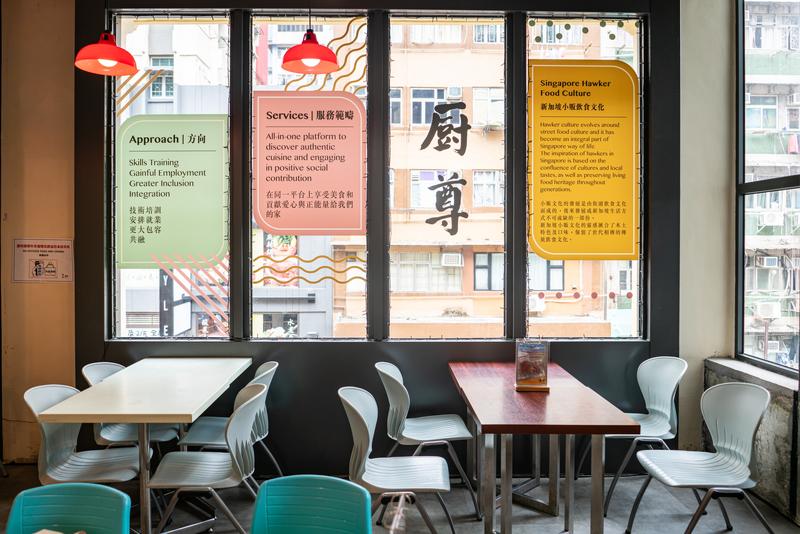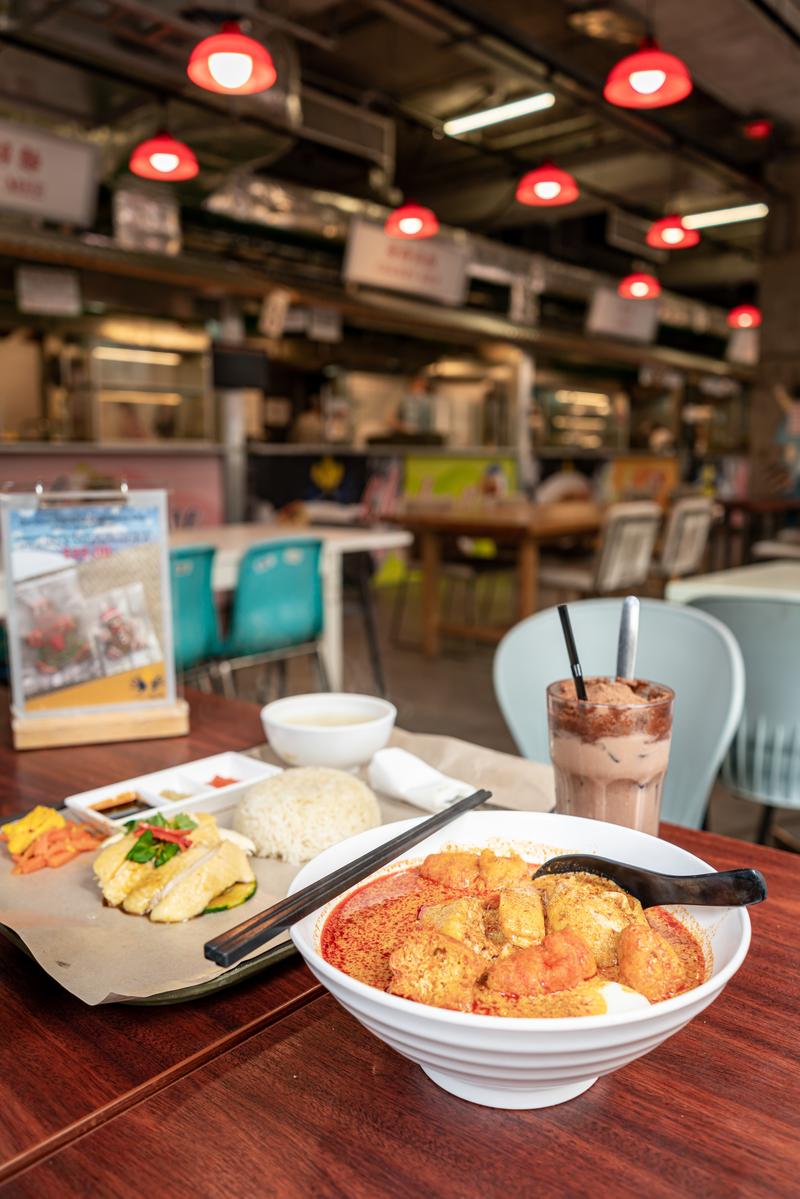As Hong Kong becomes a more inclusive society, an increasing number of restaurants are training and employing differently abled people. Faye Bradley reports.
 Koh Seng Choon poses at the entrance to Dignity Kitchen at the 618 Shanghai Street heritage building in Mong Kok. The founder of the Dignity Project opened his first Dignity Kitchen in his native Singapore in 2010, before expanding to Hong Kong in 2019. He now plans to take his social enterprise to London and the Chinese mainland. (PHOTO PROVIDED TO CHINA DAILY)
Koh Seng Choon poses at the entrance to Dignity Kitchen at the 618 Shanghai Street heritage building in Mong Kok. The founder of the Dignity Project opened his first Dignity Kitchen in his native Singapore in 2010, before expanding to Hong Kong in 2019. He now plans to take his social enterprise to London and the Chinese mainland. (PHOTO PROVIDED TO CHINA DAILY)
Dining at Dignity Kitchen in Hong Kong feels, in many ways, like a typical Singapore hawker center experience. Stalls at the canteen-style food court serve classic cheap eats like aromatic laksa and Hainan chicken rice, with fluffy pandan cake for dessert. What isn’t immediately apparent is that this dining hall’s servers and cooks are mainly differently abled or from disadvantaged backgrounds. “I focus on their abilities, not their disabilities,” says Koh Seng Choon, founder of Project Dignity. The Singapore-based social enterprise opened Dignity Kitchen in its home city in 2010, before expanding to Hong Kong in 2019.
Occupying the entire second floor of 618 Shanghai Street, a heritage building in Mong Kok, Dignity Kitchen hosts dine-in customers daily across its 6,900 square feet, and is a popular venue for corporate and private events. Its staff have various social, physical, mental or intellectual challenges, and range in age from 17 to 87. “I want to help everyone,” says Koh.
 Koh Seng Choon, founder of Dignity Kitchen, demonstrates the Chinese Sign Language for “milk”, “thank you” and “tea”. (PHOTOS PROVIDED TO CHINA DAILY)
Koh Seng Choon, founder of Dignity Kitchen, demonstrates the Chinese Sign Language for “milk”, “thank you” and “tea”. (PHOTOS PROVIDED TO CHINA DAILY)
Besides those with physical disabilities, Dignity Kitchen employs people suffering from mood disorders, socially disadvantaged individuals as well as the intellectually challenged. Workstations are specially adapted to ensure that each employee can thrive in the working environment. At one food stall serving Nanyang coffee, a poster and video tutorial show customers how to communicate in Chinese Sign Language with the hearing-impaired server. As Koh points out, it can be meaningful even to sign something as simple as “Thank you”.
Through Dignity AI, Koh also provides jobs for paraplegic individuals, who can control a robot and interact with customers while working from home. A two-way live cam enables the controller to see where the robot is going, and lets customers see and hear the controller, who welcomes them to the restaurant, recommends signature dishes and checks how their meal is going. Kitchens are wheelchair friendly, while the walls of the canteen are adorned with hand-painted, Hong Kong-inspired murals created by the staff and sponsored by corporations. Then there is Dignity Mama bookstore, providing job opportunities for single mothers and mothers with individual needs.
 Picture-driven signage at the food court shows customers how to greet and order from their hearing-impaired server. (PHOTO PROVIDED TO CHINA DAILY)
Picture-driven signage at the food court shows customers how to greet and order from their hearing-impaired server. (PHOTO PROVIDED TO CHINA DAILY)
Koh explains that he aims to get every one of his trainees a job. “If we can’t place you, we have failed,” he says. As of now though, he’s succeeded, with a 100 percent placement rate after training.
David Cheng, a hearing-impaired person and Dignity Kitchen’s food quality control officer, says, “There’s not enough support in Hong Kong for handicapped people to work and have a normal life.” Cheng has worked in catering for over a decade and initially took on the role of lead cook at Dignity Kitchen because he wanted to help train differently abled individuals. “If we recruit (people with disabilities), we have to really teach them and not just let them go to work without guidelines,” he says. Groups of 20 to 30 follow a 22-day culinary training program developed by Koh. The intensive course covers every aspect of working in a restaurant, from hygiene to food preparation to quality checks.
 Dignity Kitchen Hong Kong marries authentic Singapore hawker center vibes with local design touches including the iconic red lamps traditionally seen in Hong Kong markets. GBA briefs (PHOTO PROVIDED TO CHINA DAILY)
Dignity Kitchen Hong Kong marries authentic Singapore hawker center vibes with local design touches including the iconic red lamps traditionally seen in Hong Kong markets. GBA briefs (PHOTO PROVIDED TO CHINA DAILY)
It’s been a long journey to get here. Koh was initially invited by then-chief executive Carrie Lam Cheng Yuet-ngor to bring his concept to Hong Kong in 2014. The project didn’t go through, in part due to the disruption caused by Occupy Central, and Koh was approached again in 2019. This time he accepted, but there were even tougher times ahead. The Hong Kong protests, he recalls, saw Shanghai Street frequently vandalized as well as the closure of nearby MTR stations, causing distress to patrons and staff, not least Dignity Kitchen’s sensory-sensitive employees. The following year, COVID-19 hit.
Now, things are looking up. In April 2022, Dignity Kitchen earned a prestigious honor as one of the World’s 50 Best Restaurants’ Champions of Change. Koh shares that he’s working to set up a food court in London supporting war veterans and refugees, and also has set his sights on expanding into the Chinese mainland.
 Part of the Dignity Project, Dignity Mama bookstore provides jobs for single mothers and mothers with individual needs. (PHOTO PROVIDED TO CHINA DAILY)
Part of the Dignity Project, Dignity Mama bookstore provides jobs for single mothers and mothers with individual needs. (PHOTO PROVIDED TO CHINA DAILY)
Growth opportunities
In Cheung Sha Wan, Holy Cafe trains and employs staff with disabilities, to help them adapt to society and be part of the community. “We hope more people with disabilities in Hong Kong can be accepted and hired, as they can actually do some work well,” says founder Maria Sung Law Man-kwan, whose autistic daughter previously struggled to find a work placement despite having completed a special training program. Sung opened her restaurant in 2011 to give people like her daughter a place to work. Her efforts haven’t gone unnoticed: when Holy Cafe opened at a new location in May last year, Financial Secretary Paul Chan Mo-po officiated; six months later, in November, Sung was awarded an Honorary Fellowship by the Hong Kong Metropolitan University.
 Holy Cafe staff are joined at the restaurant’s May 2022 reopening following relocation by (back row, from left) founder Maria Sung, her daughter Flora, Swire Trust Head of Philanthropy Tina Chan, finance chief Paul Chan Mo-po, Urban Renewal Authority Managing Director Ir Wai Chi-sing and Caritas Institute of Higher Education Social Sciences Department Head Chu Cheong-hay. (PHOTO PROVIDED TO CHINA DAILY)
Holy Cafe staff are joined at the restaurant’s May 2022 reopening following relocation by (back row, from left) founder Maria Sung, her daughter Flora, Swire Trust Head of Philanthropy Tina Chan, finance chief Paul Chan Mo-po, Urban Renewal Authority Managing Director Ir Wai Chi-sing and Caritas Institute of Higher Education Social Sciences Department Head Chu Cheong-hay. (PHOTO PROVIDED TO CHINA DAILY)
On the other side of the harbor, iBakery in Kennedy Town — a social enterprise under the Tung Wah Group of Hospitals — also trains and hires people with disabilities. Meanwhile, Hong Chi Association, a nonprofit dedicated to serving people with intellectual disabilities and their families, provides training opportunities with a focus on catering and hospitality.

Maria Sung (center), founder of Holy Cafe, receives an honorary fellowship from Hong Kong Metropolitan University in November 2022, in recognition of her accomplishments and contribution to the betterment of society. (PHOTO PROVIDED TO CHINA DAILY)
When it comes to the socially impaired — many of whom fly below the radar — more needs to be done to improve public awareness, says Suzanne Law Yu-shan, behavioral consultant at the Autism Partnership Foundation (APF). “It’s easy to form a misconception that the cause of eyebrow-raising behavior is rooted in rudeness, not a special need,” she notes.
 A seating area suffused with natural light, at Dignity Kitchen Hong Kong. (PHOTO PROVIDED TO CHINA DAILY)
A seating area suffused with natural light, at Dignity Kitchen Hong Kong. (PHOTO PROVIDED TO CHINA DAILY)
The foundation’s Aspire program supports 15- to 25-year-olds with autism spectrum disorder (ASD) as they make the transition to adulthood, with a focus on social and cognitive skills, perspective taking, communication, and managing and regulating emotions and behavior. “We teach our young people with ASD all the skills and knowledge they need in a fun, friendly, hands-on environment, and we make every effort to make sure those skills are applied in their daily lives with their families and beyond,” says Law. APF also runs a training cafe, with plans to branch out into providing students with catering work experience.
 Dignity Kitchen specialties include Hainan chicken rice, the Milo dinosaur drink and chicken laksa. (PHOTO PROVIDED TO CHINA DAILY)
Dignity Kitchen specialties include Hainan chicken rice, the Milo dinosaur drink and chicken laksa. (PHOTO PROVIDED TO CHINA DAILY)
Hong Kong is becoming more supportive of neurodivergent and differently abled communities. Law says she’s pleased to see more government funding for launching social enterprises as well as increased job opportunities for the minorities concerned. Having established her social enterprise as a means to help her own child with ASD, Sung understands the challenges better than most. When it comes to Holy Cafe, she’s still in survival mode, she says, as she works to make it a sustainable business. However, she adds, “We feel lucky and grateful to receive support from charities, the government, and a lot of people with warm hearts.”


